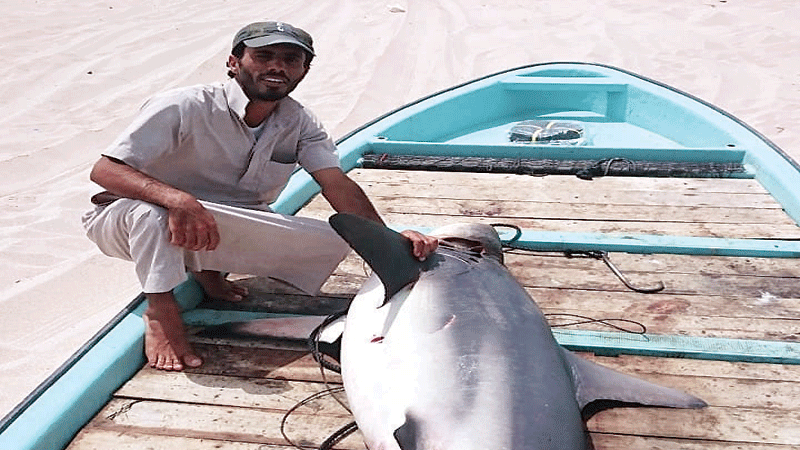

Myself, the son of a fisherman, I am intrigued by the why? The great American essayist and philosopher Henry David Thoreau pondered, “Many men go fishing all of their lives without knowing it is not fish that they are after.”
Maybe he is right, maybe it is not always what we want but the needs that drive us to do what we do, and we romanticize the justification. The commercial fisherman seeks a living for himself and his family, and catching fish is a way to do that. The sports fisherman seeks a contest, solitude, calm, serenity, and catching fish is often a bonus. We rarely ‘go fishing’ simply to catch fish. That said, I think Captain Ahab wanted to catch Moby Dick, didn’t he?
A sport fisherman, I met Rashid Al Harbi on a Sharqiya beach one afternoon, and we chatted, as is the fishermen’s custom.’ We fishermen will share everything except our best fishing spots! We chatted about fish, fishing, fishermen, and the English language that he speaks very well. He must have had a good teacher at his Ras Al Hadd school, and we swapped contact numbers. Rashid has since then been my ‘go-to man,’ for weather and sea conditions before leaving home on our more than the two-hour journey to the Sharqiya coastline and he has proven incredibly obliging and helpful.
Rashid Sutta Juma Al Harbi is a 32-years-old, born in Ras Al Hadd, married, though as yet not blessed with children, and like his brothers, like his father, and like most of his wider family, Rashid is a fisherman.
He keeps his boat ashore in Ras Al Hadd, and has respect for, although no fear of the sea. “I know most places in these waters,” he said, “and most days I will motor around fifteen kilometres to the best fishing grounds for the Tuna which I love fishing for the thrill, because of that, it is fun, though difficult, work, and I must keep fit, strong and healthy.”
Most of the time he fishes with the plastic ‘Rapala’ type lures which have revolutionized fishing for predator species at sea. They are plastic imitation fish that ‘wobble’ in the water like wounded and vulnerable baitfish. Most have two hooks and are towed along behind the boat at various depths, determined by the weight and design of the lure, and at speeds which are each fisherman’s secret.
“We have to go fast enough to get the predators like Mahi Mahi and Tuna to attack the lure without looking too closely at it, or they will see it’s not real, and yet slowly enough they can attack it. That is the skill.”
“One day,” he shared, “I caught a 95kg Tuna and hauled it aboard my boat alone. I was exhausted, and elated, and happy and sad all at once.”
This relationship between fishermen and fish is a complex one, with respect and admiration in evidence as a worthy foe or a young, immature fish is often returned to the sea.
Yet men need victories, and sometimes despite that respect, we must do what we must do, and to paraphrase Turkish poet Mehmet Murat Ildan, “the moment when the fisherman catches the fish, is one of agony and ecstasy, darkness and light, joy and sadness, life and death, all come face to face in a moment.”
“The sea is amazing, and I see Whales, Dolphins, and Turtles all the time, but there are not many big sharks in the sea now, so there is nothing to fear. The fish are getting harder to catch, maybe because we catch too many, or maybe they are just getting too clever for us?” he thought aloud. The remarkable Vincent van Gogh is more renowned for his art than his words, yet he philosophized that, “The fisherman knows that the sea is dangerous and the storms terrible, yet they have never found this sufficient reason to stay ashore.” And here he may well be true.
Rashid Al Harbi perpetuates a family legacy, a cultural, hereditary, and traditional link to the sea, and his enthusiasm is genuine, he wishes to be an ordinary man, “not special,” and yet, no fisherman is ever ordinary. If ever he heard these immortal words of Ernest Hemingway, he would revel in their sincerity: “Perhaps I should not have been a fisherman, but that was the thing I was born for.”
BY RAY PETERSEN
Oman Observer is now on the WhatsApp channel. Click here



